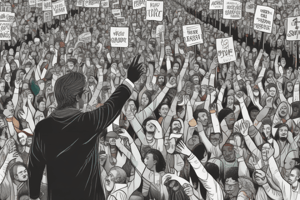Podcast
Questions and Answers
Which stage of social movements typically involves the formal organization of the movement?
Which stage of social movements typically involves the formal organization of the movement?
- Coalescence
- Bureaucratization (correct)
- Emergence
- Decline
What is primarily referred to as an aspect that enables individuals to organize and engage in collective action?
What is primarily referred to as an aspect that enables individuals to organize and engage in collective action?
- Framing processes
- Declining phases
- Mobilizing structures (correct)
- Opportunity structures
Which of the following is NOT a type of social movement?
Which of the following is NOT a type of social movement?
- Reactionary movements
- Revolutionary social movement
- Redemptive social movement
- Transformational social movement (correct)
What drives the motivation to join a social movement according to the content?
What drives the motivation to join a social movement according to the content?
Which of the following options best captures the objective of framing processes in social movements?
Which of the following options best captures the objective of framing processes in social movements?
What is the significance of opportunity structures in social movements?
What is the significance of opportunity structures in social movements?
Which motivation for social movements is characterized by a strong personal investment in the movement's goals?
Which motivation for social movements is characterized by a strong personal investment in the movement's goals?
Which of the following factors is NOT considered part of opportunity structures?
Which of the following factors is NOT considered part of opportunity structures?
What type of social movement seeks to change specific policies without altering the existing social system?
What type of social movement seeks to change specific policies without altering the existing social system?
Which stage of a social movement typically involves individuals organizing and strategizing for collective action?
Which stage of a social movement typically involves individuals organizing and strategizing for collective action?
Which factor is NOT part of the opportunity structures for social movements?
Which factor is NOT part of the opportunity structures for social movements?
Which of the following motivations describes a person's desire to belong to a collective movement without necessarily having a strong personal stake?
Which of the following motivations describes a person's desire to belong to a collective movement without necessarily having a strong personal stake?
What is a defining characteristic of reactionary social movements?
What is a defining characteristic of reactionary social movements?
Which element of mobilizing structures primarily addresses how participants engage in contentious activities?
Which element of mobilizing structures primarily addresses how participants engage in contentious activities?
Which type of social movement is characterized by a focus on personal transformation and deep psychological change?
Which type of social movement is characterized by a focus on personal transformation and deep psychological change?
In the framing processes of social movements, which aspect is primarily addressed?
In the framing processes of social movements, which aspect is primarily addressed?
Flashcards
Social Movement Definition
Social Movement Definition
A collective action driven by members' attitudes and aspirations, typically operating within a loose framework.
Social Movement Type: Alternative
Social Movement Type: Alternative
Seeks limited social change focused on a specific group or issue.
Social Movement Type: Redemptive
Social Movement Type: Redemptive
Aims to create radical change in individuals' lives.
Social Movement Type: Reformative
Social Movement Type: Reformative
Signup and view all the flashcards
Social Movement Type: Revolutionary
Social Movement Type: Revolutionary
Signup and view all the flashcards
Social Movement Type: Reactionary
Social Movement Type: Reactionary
Signup and view all the flashcards
Social Movement Stages
Social Movement Stages
Signup and view all the flashcards
Social Movement Formation Factors
Social Movement Formation Factors
Signup and view all the flashcards
What drives social movements?
What drives social movements?
Signup and view all the flashcards
What are the types of social movements?
What are the types of social movements?
Signup and view all the flashcards
Alternative Movement
Alternative Movement
Signup and view all the flashcards
Redemptive Movement
Redemptive Movement
Signup and view all the flashcards
Reformative Movement
Reformative Movement
Signup and view all the flashcards
Revolutionary Movement
Revolutionary Movement
Signup and view all the flashcards
Reactionary Movement
Reactionary Movement
Signup and view all the flashcards
What are the stages of a social movement?
What are the stages of a social movement?
Signup and view all the flashcards
Study Notes
Social Movements
- A social movement is a form of collective behavior where individuals act based on shared attitudes and aspirations. This action typically occurs within a loosely structured organization.
Types of Social Movements
- Alternative: Focuses on limited social change for a specific group.
- Redemptive: Aims to change individuals' behavior, often with spiritual or moral goals.
- Reformative: Seeks to modify existing social structures and policies.
- Revolutionary: Aims to drastically alter the existing social and political systems.
- Reactionary: Seeks to return to past social norms or values.
Motivation for Involvement
- Personal advantage
- Principled commitment
- Sense of self-identity
- Desire to belong to a group
- Claims making
Stages of Social Movements
- Emergence (early stages)
- Coalescence (growth and organization)
- Bureaucratization (formal organization)
- Decline (weakening or end)
Formation of Social Movements
- Mobilizing Structures: Mechanisms that facilitate collective action, including social structures and tactics.
- Opportunity Structures: Environmental factors influencing movement activity, such as political access, elite alliances, and state responses.
- Framing Processes: Crafting and disseminating narratives to justify actions and motivate individuals.
Mobilizing Structures (Detailed)
- Participation level
- Contentious activity
- Organizational issues
Opportunity Structures (Detailed)
- Relative accessibility of the political system
- Stability or fragmentation of elite alignments
- Presence of elite allies
- State capacity and propensity for repression
Framing Processes (Detailed)
- Ability to bypass mass media
- Flexible dissemination strategies
- New channels
New Social Movements
- Attract young, well-educated, and relatively affluent individuals.
- Often characterized by post-material concerns
- Focus on new forms of political activism (some call "new politics").
Collective vs. Connective Action
- Digitalization
- Individualized frames
Studying That Suits You
Use AI to generate personalized quizzes and flashcards to suit your learning preferences.




